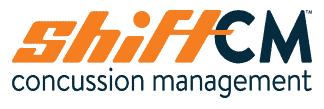The simplest definition of a concussion baseline test is a series of physical and cognitive tests that measure healthy brain function before a sports season starts – and prior to an injury. This serves as a “benchmark” for comparison in the event a concussion occurs during the season. In the event of a concussion, the results of these tests can be used as a comparison to help your healthcare provider make important return-to-sport decisions.
Should we be relying on symptoms alone?
Symptoms disappearing or going away after a concussion is considered a poor indicator of brain recovery. If a concussed athlete shows no more symptoms, this does not mean that they have fully recovered from their concussion.
As we know, a concussion causes disturbances in brain cells, changes in blood flow to the brain, and a number of other functional issues. Research shows that prior to full recovery from a concussion, the brain is very vulnerable. Even smaller impacts could cause another concussion, which could result in severe brain injury or, in rare cases, death.
The safest thing that a concussed athlete can do is avoid returning to high-risk sports until after they have fully recovered from their concussion; not just from their symptoms while being advised from a qualified health care professional.
How could a concussion baseline test help?
When properly used and interpreted, a concussion baseline test can add useful information to the management of concussions by giving healthcare practitioners insight into an athlete’s individualized pre-injury function and abilities. Simply, we have a better understanding of an athlete’s healthy state and what type of results they should achieve when fully recovered.
Having access to these test scores after a concussion injury can provide healthcare practitioners with a set of personalized, objective data that could be used to make more informed and safer return to play decisions for an injured athlete.
Differences of view.
In the last few years, baseline testing has become widely accepted however there have been some differences in opinion particularly as it pertains to tools being used, reliability, validity, and sensitivity of testing, who is completing the testing, with what training, and in what environment as well as the age groups of athletes being tested.
Some examples of concern include:
- Implementation of testing with limited staff support and training, limited supervision
- Discrepancy on what each baseline test consists of
- Stability of test scores over time
- Failures to check for invalidities
- Environmental conditions not controlled
- Mass testing initiatives where quality is sacrificed for quantity
Is Baseline Testing Right for Me and My Team?
We need to consider evolving research and age-specific recommendations that currently exist. While there continues to be advancements in both the development and use of neurocognitive testing, there is not sufficient evidence to support the use of testing at baseline in children and young adolescent populations. Eliminating baseline testing in youth sports does not minimize the need for continued education and training initiatives!
Furthermore, although concussions can happen anywhere, athletes who play sports with a low risk of concussion (swimming, golf, tennis, etc.) would have to consider whether baseline testing adds enough value given their relatively low risk of concussion injury.
Your role in providing seasonal support.
Outside of baseline testing alone, there is an important role we play as rehabilitation professionals in concussion management and education:
- Improving general awareness and injury-reporting by athletes
- Improving concussion recognition and early action by parents, coaches,
trainers and sideline staff/volunteers - Providing a clear “pathway” from injury to return to play: concussion protocols
- Offering clinical assessment and rehabilitation support if a concussion is sustained
If you are a healthcare professional that wants to learn about how to provide effective, evidence-based treatment for concussion patients, click here.


Leave a Reply